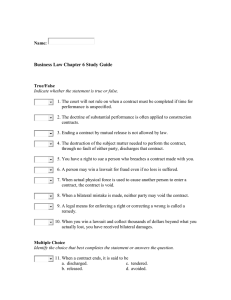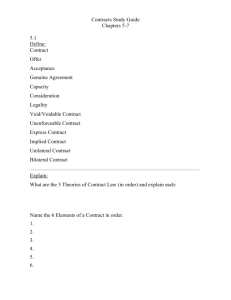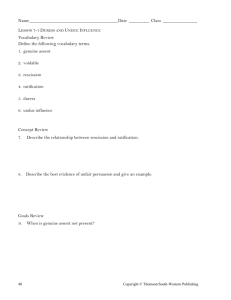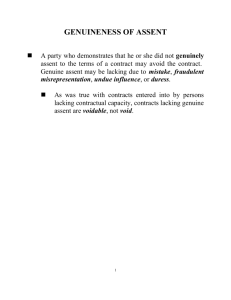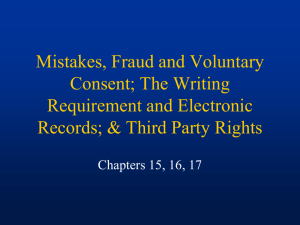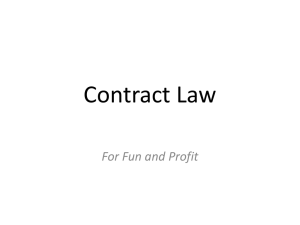Using Legal Language
advertisement
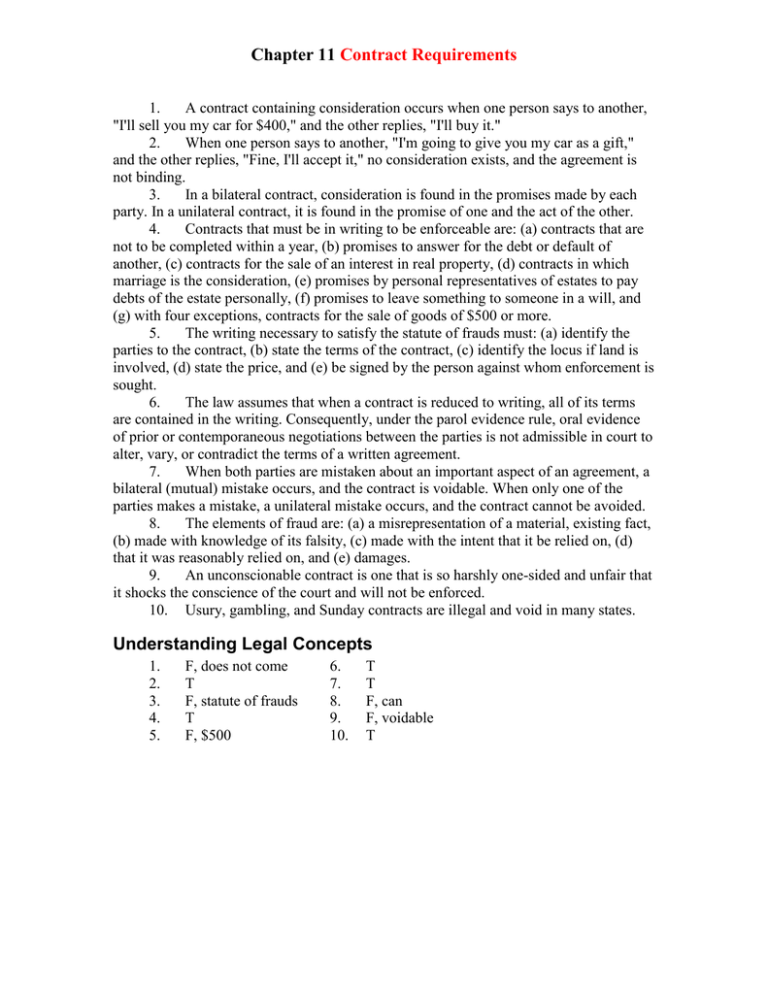
Chapter 11 Contract Requirements 1. A contract containing consideration occurs when one person says to another, "I'll sell you my car for $400," and the other replies, "I'll buy it." 2. When one person says to another, "I'm going to give you my car as a gift," and the other replies, "Fine, I'll accept it," no consideration exists, and the agreement is not binding. 3. In a bilateral contract, consideration is found in the promises made by each party. In a unilateral contract, it is found in the promise of one and the act of the other. 4. Contracts that must be in writing to be enforceable are: (a) contracts that are not to be completed within a year, (b) promises to answer for the debt or default of another, (c) contracts for the sale of an interest in real property, (d) contracts in which marriage is the consideration, (e) promises by personal representatives of estates to pay debts of the estate personally, (f) promises to leave something to someone in a will, and (g) with four exceptions, contracts for the sale of goods of $500 or more. 5. The writing necessary to satisfy the statute of frauds must: (a) identify the parties to the contract, (b) state the terms of the contract, (c) identify the locus if land is involved, (d) state the price, and (e) be signed by the person against whom enforcement is sought. 6. The law assumes that when a contract is reduced to writing, all of its terms are contained in the writing. Consequently, under the parol evidence rule, oral evidence of prior or contemporaneous negotiations between the parties is not admissible in court to alter, vary, or contradict the terms of a written agreement. 7. When both parties are mistaken about an important aspect of an agreement, a bilateral (mutual) mistake occurs, and the contract is voidable. When only one of the parties makes a mistake, a unilateral mistake occurs, and the contract cannot be avoided. 8. The elements of fraud are: (a) a misrepresentation of a material, existing fact, (b) made with knowledge of its falsity, (c) made with the intent that it be relied on, (d) that it was reasonably relied on, and (e) damages. 9. An unconscionable contract is one that is so harshly one-sided and unfair that it shocks the conscience of the court and will not be enforced. 10. Usury, gambling, and Sunday contracts are illegal and void in many states. Understanding Legal Concepts 1. 2. 3. 4. 5. F, does not come T F, statute of frauds T F, $500 6. 7. 8. 9. 10. T T F, can F, voidable T Checking Terminology 1. 2. 3. 4. 5. 6. h t ee r e ii 7. 8. 9. 10. 11. 12. bb z n i k a 13. 14. 15. 16. 17. 18. g, o v ff b hh p 19. 20. 21. 22. 23. 24. l jj c aa s dd 25. 26. 27. 28. 29. 30. y cc m u w gg 31. 32. 33. 34. 35. x f q kk j Using Legal Language The smooth talking salesperson promised to pay for a free cataract operation for an elderly woman who was almost blind. The salesperson was the promisor and the elderly woman was the promisee; however, because the elderly woman promised nothing in exchange for the cataract operation, she suffered no detriment. For this reason, no consideration occurred, and the agreement was a(n) nudum pactum. Had the promise been in writing and put under seal by the use of the letters "L.S." (which stands for locus sigilli), it would have been binding in some states. The sales person also committed fraud or deceit when he lied to the elderly woman. He talked her into buying some worthless land with a shack on it by telling her that the locus was beautiful high ground when it was actually swamp land. The type of fraud was fraud in the inducement, because the salesperson's lie induced the woman to enter into the contract. Because the salesperson was not in a position of trust, the wrongful act was not undue influence, and it was not duress because the woman's free will was not overcome by threats of physical harm. It was fraud in esse contractus, however, when the salesperson told the woman that she was signing a second copy of the contract when she was actually signing a check for $10,000. The writing that the woman signed met the requirements of a(n) memorandum and, for that reason, was sufficient to satisfy the statute of frauds. Because it was drawn up by the seller to the seller's advantage and offered to the woman on a take-or-leave-it basis, the court might consider the contract to be a(n) adhesion contract. In addition, the court might consider the contract to be unconscionable because the woman agreed to buy a shack on an acre of worthless swamp land for $250,000. Under the terms of the contract, she was to pay $100,000 in cash and sign a note for the balance at 50 percent per annum interest, which is usury. Although the parol evidence rule does not allow prior oral statements by the parties into evidence in court to alter the terms of a written agreement, an exception exists when fraud is committed. In addition, because both parties were mistaken as to the existence of the subject matter when they signed the contract (the shack on the property had burned down two days before the contract was signed), the contract was voidable. The mistake was a(n) mutual mistake, which is also known as a(n) bilateral mistake not a(n) unilateral mistake. Puzzling Over What You Learned 1 2 D 3 4 5 L A C K O F D C S I D N U A L R S D 9 U R Y 7 A T I O V P I I N A T D C R N D O E 8 E E C A E 10 S ON R H U 6 U E E I 11 L O C U I I S D O N I 12 N N N F F 13 S D U R E S S L 14 C I M C E A U 15 O E N I L U F E I I N C R C T M N D M D O T N O U R C A R A E B M L E O A C T N O D E 16A E F U F I R M F N 17 M UT U A L MI S TAK E R Caveat: Allow squares for spaces between words and punctuation (apostrophes, hyphens, etc.) when filling in crossword. Across 3. A defense available when no consideration is contained in an agreement. 8. The charging of a greater amount of interest than is allowed by law. 10. A mark, impression, the word "seal," or the letters "L.S." 11. Place; locality. 13. The overcoming of a person's free will by the use of threat or physical harm. 16. Approve. 17. Another name for a bilateral mistake. Down 1. Misrepresentation of a material, existing fact knowingly made. 2. Overcoming a person's free will by misusing a position of trust. 4. One-sided contract that must be accepted as is. 5. Fraud that induces another to enter into a contract. 6. In equal fault. 7. Annulled, canceled, or made void. 9. So harshly one-sided and unfair as to shock the court's conscience. 12. Another name for deceit. 14. The writing that is necessary to satisfy the statute of frauds. 15. A merchant's written promise to hold an offer open for the sale of goods.
